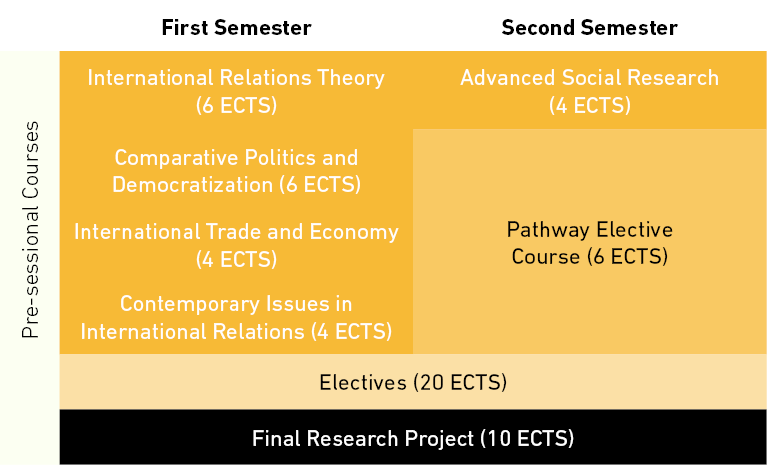Syllabus Full Time
The course syllabus presents an innovative structure, stimulating continuous learning, with highly-qualified teachers linked to the three universities that jointly offer the degree, the Universitat Autònoma de Barcelona, the Universitat de Barcelona and the Universitat Pompeu Fabra, as well as to other major international academic institutions.
The Master's in International Relations is offered in two different language options: the bilingual (Spanish-English) option, in which students follow approx. half the compulsory courses in each of the two languages, while they can choose from the whole range of electives in either in Spanish or English and the English-only option, in which all the compulsory courses are taught in English, including the pathway core courses. In this language track, students can also choose elective courses in Spanish, if they wish. The electives are offered to a large extent in English, however, some will only be available in Spanish. More detailed information about the courses can be found on the website.
The Master's syllabus is made up of a combination of core subjects and a wide range of electives that reflect the students' individual interests. Building on knowledge acquired in the first semester, in the second semester students will take a pathway specialty and, in this way, build their education according to their individual interests within the different International Relations themes.
During their second semester of studies, students can choose one of the following five pathways:
- Conflict, Threats and Violence in Global Politics
- Global Governance
- International Environmental Politics
- International Political Economy
- Mediterranean Area Studies
In addition, IBEI is offering concentrations, suggested groups of four or five elective courses and a pathway course that combine to give a clear focus on one policy area or region. Students may choose how many of the electives to take, and may also choose freely from across all of the electives on offer.
|
Conflict in Global Politics | |
|---|---|
| Pathway: | Conflict, Threats and Violence in Global Politics |
| Semester 1 elective: | |
|
Semester 2 electives: |
Peace Processes and Conflict Resolution Seguridad Internacional y Fuerzas Armadas The politics and practice of international humanitarianism |
|
Governance and Diplomacy | |
|---|---|
| Pathway: | Global Governance |
| Semester 1 elective: |
International Relations of Global Cities The BRICS and the Global Power Shift |
|
Semester 2 electives: |
Politics of International Sanctions Foreign Policy, Diplomacy and Globalization International Relations in Latin America International Relations in Asia International Relations of the Middle East Foreign and Security Policy of the Russian Federation Complex Governance of Global Challenges Politics of International Organizations Science Diplomacy |
|
Environment and Sustainability | |
|---|---|
| Pathway: | International Environmental Policy |
| Semester 1 elective: |
Understanding Development: theory and practice Programme Evaluation in Development |
|
Semester 2 electives: |
Development, Environment and Natural Resources Natural Resources and Armed Conflicts Geopolitics of Energy |
|
Global Political Economy | |
|---|---|
| Pathway: | International Political Economy |
| Semester 1 elective: |
European Union Political Processes Political Economy of Welfare State Data Analysis for International Relations |
|
Semester 2 electives: |
International Business and Economic Institutions Game Theory for International Relations |
|
The Politics of the MENA Region | |
|---|---|
|
Pathway: |
Mediterranean Area Studies |
|
Semester 1 electives: |
|
|
Semester 2 electives:
|
International Relations of the Middle East |
The Master's in International Relations programme includes three different types of courses and a final dissertation:
- Core courses: 24 ECTS (depending on studies previously carried out, it may be possible to replace a core course with an equivalent or greater number of elective course credits)
- Pathway core courses: 6 ECTS (subject to be chosen according to the pathway selected)
- Electives: 20 ECTS
- Final Dissertation: 10 ECTS
Throughout the year, IBEI offers both students and teaching staff a series of conferences and seminars carried out by high-profile international specialists as well as well-known professionals and politicians.
Syllabus (one-year, full-time option)

